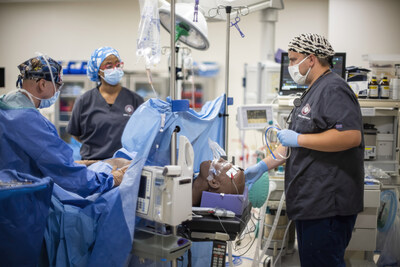Rosalind Franklin University Launches Doctor of Nursing Practice Program in Adult-Gerontology Acute Care
Meeting the Nation's Rising Demand for Adult-Gerontology Acute Care with Flexible, Advanced Nurse Practitioner Training
NORTH CHICAGO, Ill., Oct. 8, 2025 /PRNewswire/ -- Rosalind Franklin University College of Nursing announces the launch of a new specialty track in the Doctor of Nursing Practice (DNP) program to prepare Adult-Gerontology Acute Care Nurse Practitioners (AGACNP). The specialty track will prepare nurses to deliver high-level, complex care to patients across acute and critical settings.
With demand for acute care providers at an all-time high, the specialty expands the scope of practice for advanced practice nurses, offering career longevity, flexibility and preparation for leadership roles. Students will gain the skills to confidently deliver complex, evidence-based care, and lead interprofessional teams in high-acuity patient care environments.
"Our students come to us with a deep commitment to their patients and communities," said Lisa Hopp, PhD RN FAAN, Dean of the College of Nursing. "This program was designed with them in mind, today's learners who need flexibility, support, and meaningful clinical experiences. We want every graduate to leave here confident not only in their clinical expertise, but also in their ability to lead and make a real difference in the lives of acutely ill adults and their families."
The new program emphasizes immersive, hands-on training through simulation labs, advanced anatomy labs, and faculty-guided clinical practice experiences, alongside board exam preparation and ongoing faculty support. Students will also engage in interprofessional education among peers from other health disciplines, building the teamwork skill essential for today's complex healthcare systems.
A Growing National Need
Demand for acute care nurses, particularly acute care nurse practitioners (NPs), is being driven by a physician shortage, projected growth in hospital and specialized care, and patient satisfaction with NPs. The Bureau of Labor Statistics projects the need for NPs will grow by 40% by 2034 — much faster than the average for all occupations — underscoring the vital importance of graduate-level nursing programs that prepare specialists in acute care.
"The DNP in Adult-Gerontology Acute Care reflects our university's commitment to innovation in health professions education," said Dr. Jim Carlson, PhD, PA-C, CHSE-A, Interim Provost and Vice President for Interprofessional Education and Simulation. "By integrating advanced clinical preparation with interprofessional learning, we are ensuring our graduates are not only practice-ready but also positioned to shape the future of acute care delivery."
Enrollment for the inaugural cohort is now open. For more information, visit https://www.rosalindfranklin.edu/academics/college-of-nursing/degree-programs/adult-gerontology-acute-care-nurse-practitioner-dnp/.
About Rosalind Franklin University
Rosalind Franklin University of Medicine and Science is committed to serving humanity through the interprofessional education of health and biomedical professionals and the discovery of knowledge dedicated to improving wellness. The university embodies the spirit of inquiry and excellence modeled by its namesake Dr. Rosalind Franklin, whose Photo 51 was crucial to solving the structure of DNA. Recognized for its research in areas including neuroscience, brain-related diseases, inherited disorders, diabetes, obesity, and gait and balance, RFU encompasses the Chicago Medical School, College of Health Professions, College of Nursing, College of Pharmacy, School of Graduate and Postdoctoral Studies and the Dr. William M. Scholl College of Podiatric Medicine. Learn more at rosalindfranklin.edu
Media Contact:
Office of Marketing and Communications
media@rosalindfranklin.edu
![]() View original content to download multimedia:https://www.prnewswire.com/news-releases/rosalind-franklin-university-launches-doctor-of-nursing-practice-program-in-adult-gerontology-acute-care-302578472.html
View original content to download multimedia:https://www.prnewswire.com/news-releases/rosalind-franklin-university-launches-doctor-of-nursing-practice-program-in-adult-gerontology-acute-care-302578472.html
SOURCE Rosalind Franklin University of Medicine and Science



